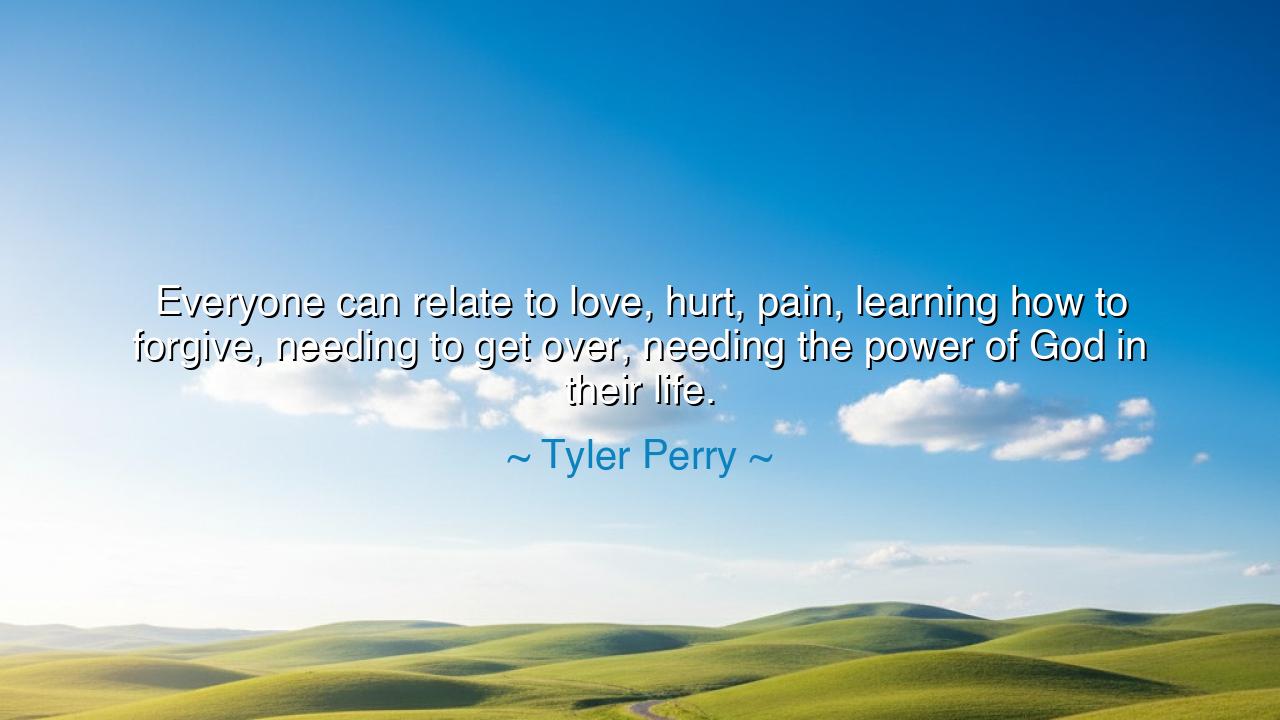
Everyone can relate to love, hurt, pain, learning how to forgive
Everyone can relate to love, hurt, pain, learning how to forgive, needing to get over, needing the power of God in their life.






“Everyone can relate to love, hurt, pain, learning how to forgive, needing to get over, needing the power of God in their life.” – Tyler Perry
In these words, Tyler Perry, the storyteller of the soul’s struggles, reaches beyond the veil of art and into the shared heart of humanity. He speaks of the truths that bind all people, regardless of station, creed, or age. For though the world may divide itself by wealth, language, or color, the experiences of love, hurt, pain, and the difficult grace of forgiveness are common to every mortal being. What he expresses is not simply emotion — it is universal humanity, the eternal pattern of breaking and mending, of falling and rising again through the strength of the divine. His words remind us that in the depths of suffering and the heights of joy, all souls are kin.
The origin of this truth lies in Perry’s own life, carved from hardship and faith. Born into poverty and abuse, he endured years of anguish before finding his voice as a writer and filmmaker. He knew pain intimately — the kind that silences the heart and clouds the mind. Yet through his art, he transformed that pain into healing, not only for himself but for countless others. His characters — flawed, wounded, yet striving — became vessels of the same lessons he had lived: that love redeems, forgiveness restores, and the power of God lifts even the most broken spirit. This quote, then, is not philosophy alone — it is testimony, the voice of one who walked through darkness and emerged carrying the light.
To love is to open oneself to both joy and suffering, to the beauty of connection and the ache of loss. Every human heart, no matter how proud or guarded, has felt the fire of affection and the sting of betrayal. The hurt that follows love’s loss is the crucible of growth, for it teaches humility, patience, and empathy. Pain refines the spirit as fire refines gold. And yet, as Perry reminds us, pain alone is not the end — it is a passage, leading toward forgiveness. For to forgive is to rise above injury, to reclaim one’s peace from the hands of resentment. The one who forgives is not weak, but mighty — for they choose healing over hatred, and freedom over bitterness.
The ancients spoke of this same truth in their own tongues. King David, broken by sin and sorrow, sang in his psalms of the power of God to cleanse the heart and restore joy. Nelson Mandela, after twenty-seven years in prison, emerged without vengeance, saying, “Resentment is like drinking poison and hoping it will kill your enemy.” And even Jesus of Nazareth, upon the cross, offered forgiveness to those who crucified Him. These are not tales of saints alone, but mirrors for every soul — for in each of us lies the same capacity for compassion, for renewal, for divine strength.
When Perry says, “Everyone can relate,” he reminds us that suffering is not shameful, nor is struggle unique. Too often we believe that our wounds isolate us — but in truth, they unite us. The mother grieving her child, the man betrayed by a friend, the young woman battling fear — all drink from the same cup of human experience. What separates us is not our pain, but our response to it. Some allow bitterness to rule their hearts; others, guided by faith, find meaning in their trials. The power of God, as Perry speaks of it, is not merely an external rescue — it is the awakening of the divine within, the quiet voice that says, “Rise again, for you are not alone.”
To learn how to forgive and to get over does not mean to forget or to deny pain. It means to release it into the hands of eternity, to let time and grace turn wounds into wisdom. Every scar tells a story, but it need not define the ending. The wise of every age have taught this — that forgiveness is the bridge between human weakness and divine peace. Without it, man remains chained to the past; with it, he walks forward into light. Forgiveness is not given because the other deserves it, but because the soul deserves to be free.
So let this be the teaching passed down: embrace the full measure of being human. Do not flee from love for fear of hurt, nor deny your pain when it arrives. Feel deeply, but let your feelings lead you to growth. Seek forgiveness — not as an act of surrender, but of power. And in your darkest hours, when strength seems gone, reach for the power of God, which dwells not in the heavens alone but in the quiet resilience of your own heart. It is that power which turns despair into purpose and tragedy into transformation.
For as Tyler Perry reminds us, the story of every soul is the same — a tale of falling and rising, of breaking and mending, of losing and finding grace. To live is to learn, again and again, the sacred art of loving, hurting, forgiving, and overcoming. And when we do so, when we allow divine love to move through us, we become part of something eternal — a humanity bound not by suffering, but by the strength to heal.






AAdministratorAdministrator
Welcome, honored guests. Please leave a comment, we will respond soon